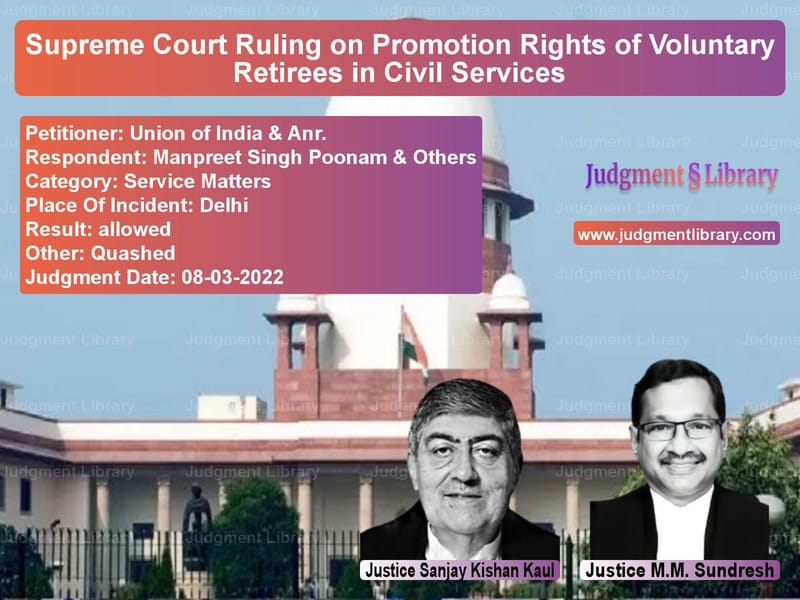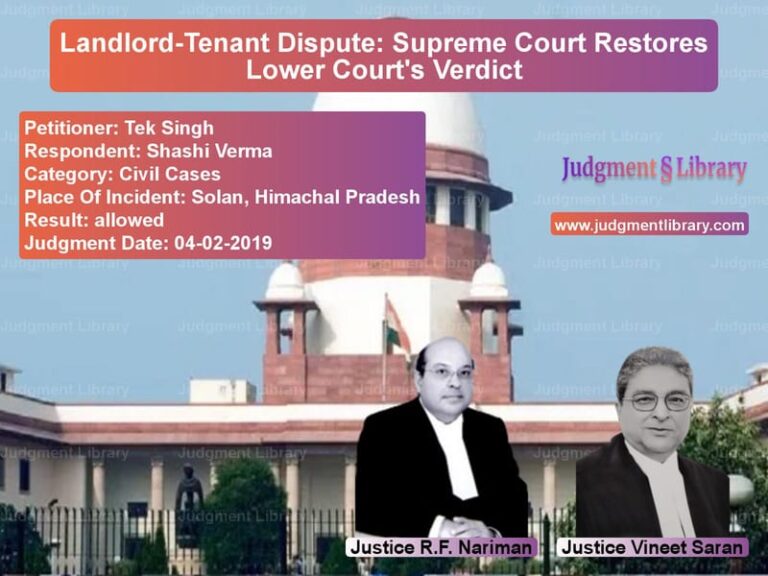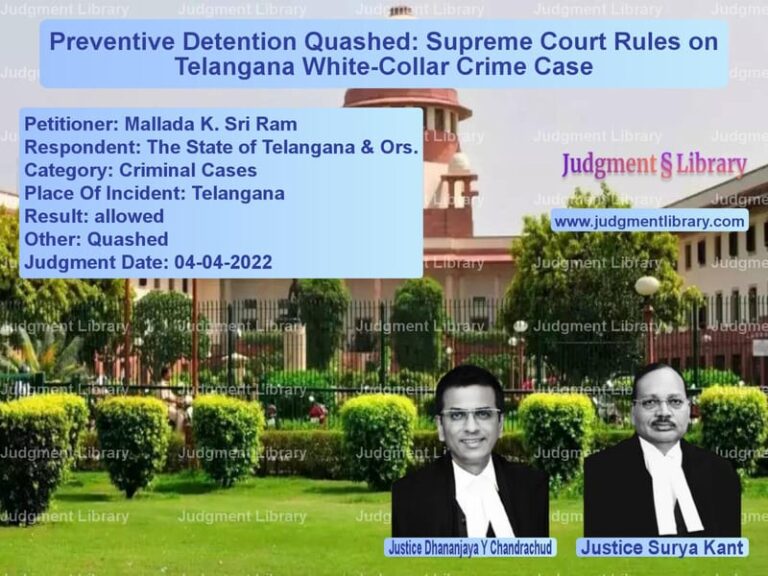Supreme Court Ruling on Promotion Rights of Voluntary Retirees in Civil Services
The case of Union of India & Anr. vs. Manpreet Singh Poonam & Others revolved around the fundamental question of whether a voluntary retiree in civil services could claim the right to promotion after retirement. The Supreme Court upheld the Union of India’s appeal, ruling that voluntary retirees cannot claim promotion retrospectively, and a mere delay in consideration of promotion does not create a vested right over a promotional post.
This ruling sets a significant precedent on the rights of government employees regarding promotions and voluntary retirement.
Background of the Case
The respondents in the case, Manpreet Singh Poonam & Others, were officers in the Junior Administrative Grade-II (JAG-II) of the National Capital Territory of Delhi, Andaman and Nicobar Islands, Lakshadweep, Daman and Diu, and Dadra and Nagar Haveli Civil Service.
The first respondent, Manpreet Singh Poonam, took voluntary retirement in 2010, while the second respondent was promoted on an ad-hoc basis to Junior Administrative Grade-I (JAG-I) on December 27, 2011, and later regularized with effect from July 1, 2011. Their promotion was subject to selection based on vacancies, as prescribed under Rule 4 of the 2003 Rules.
Both respondents approached the Central Administrative Tribunal (CAT) seeking retrospective promotion, but their applications were dismissed. They then filed writ petitions before the Delhi High Court, which ruled in their favor, directing that their promotions be reconsidered retrospectively. The Union of India challenged this decision before the Supreme Court.
Arguments of the Petitioner (Union of India)
The Union of India, represented by Ms. Rekha Pandey, argued:
- A voluntary retiree cannot seek promotion as a matter of right unless there is a specific provision in the service rules.
- The promotion process in civil services follows a suitability-based selection, meaning not every eligible candidate is entitled to promotion.
- Promotions in JAG-I are governed by the 2003 Rules, which set a cap of 10% of the total sanctioned strength for promotions.
- The respondents’ claim of retrospective promotion ignored the fact that the actual vacancy in JAG-I arose only in 2011, and promotion could only be granted based on actual vacancies.
- The High Court erred in applying Circular No. AB.14017/47/2011-EST (DR) dated August 1, 2012, which was meant for upgradation, not for promotions based on selection.
Arguments of the Respondent (Manpreet Singh Poonam & Others)
The respondents, represented by Ms. Avnish Ahlawat, countered:
- The delay in holding the Departmental Promotion Committee (DPC) meeting should not disadvantage eligible officers.
- The respondents were already in the select list for the year 2009, and thus, their promotions should be granted from 2009 instead of 2011.
- Promotion from JAG-II to JAG-I was an upgradation rather than a strict promotion.
- The delay in holding the DPC created a situation where eligible officers lost their rightful promotions due to administrative lapses.
Supreme Court’s Observations
The Supreme Court, comprising Justices Sanjay Kishan Kaul and M.M. Sundresh, made key observations:
- There is no vested right for an employee to claim promotion retrospectively unless provided for in the rules.
- Rule 4 of the 2003 Rules clearly states that vacancies in JAG-I are to be filled by promotion from JAG-II based on suitability.
- The existence of vacancies does not automatically grant the right to promotion; it must be done through a selection process.
- Once an officer opts for voluntary retirement, they cease to be a part of service and cannot claim subsequent promotions.
- The High Court misinterpreted the promotion process, as JAG-I was a higher post requiring selection, and not an automatic upgradation.
The Court emphasized:
“A mere existence of a vacancy per se will not create a right in favor of an employee for retrospective promotion when vacancies in the promotional post are prescribed under rules and mandate clearance through a selection process.”
Supreme Court’s Verdict
On March 8, 2022, the Supreme Court ruled:
- The Delhi High Court’s judgment was set aside.
- The decision of the Central Administrative Tribunal (CAT) was restored.
- The claim for retrospective promotion was denied, as promotions in JAG-I could only be granted based on vacancies and selection.
- A voluntary retiree has no right to claim promotion after retirement.
The Court concluded:
“The appeals stand allowed, and consequently, the order passed by the High Court stands set aside.”
Conclusion
The Supreme Court’s ruling reinforces several legal principles:
- Voluntary retirement severs all future promotional rights: Once an employee retires voluntarily, they cannot claim promotions later.
- Promotion is based on actual vacancies: Employees must meet selection criteria and cannot claim seniority from notional vacancies.
- Judicial restraint in administrative decisions: Courts should not interfere in service matters unless there is clear illegality or arbitrariness.
- Selection-based promotions require due process: Not all eligible candidates are entitled to promotion; suitability and selection are crucial.
This ruling ensures that government promotions are governed strictly by service rules and administrative procedures, preventing retrospective claims that could disrupt service structures.
Petitioner Name: Union of India & Anr..Respondent Name: Manpreet Singh Poonam & Others.Judgment By: Justice Sanjay Kishan Kaul, Justice M.M. Sundresh.Place Of Incident: Delhi.Judgment Date: 08-03-2022.
Don’t miss out on the full details! Download the complete judgment in PDF format below and gain valuable insights instantly!
Download Judgment: union-of-india-&-anr-vs-manpreet-singh-poona-supreme-court-of-india-judgment-dated-08-03-2022.pdf
Directly Download Judgment: Directly download this Judgment
See all petitions in Promotion Cases
See all petitions in Public Sector Employees
See all petitions in Recruitment Policies
See all petitions in Judgment by Sanjay Kishan Kaul
See all petitions in Judgment by M.M. Sundresh
See all petitions in allowed
See all petitions in Quashed
See all petitions in supreme court of India judgments March 2022
See all petitions in 2022 judgments
See all posts in Service Matters Category
See all allowed petitions in Service Matters Category
See all Dismissed petitions in Service Matters Category
See all partially allowed petitions in Service Matters Category







